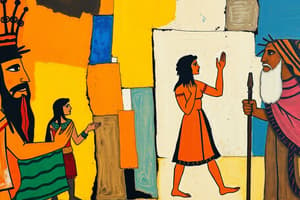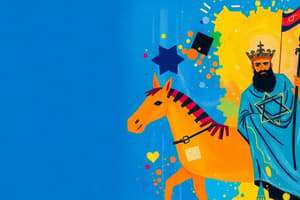Podcast
Questions and Answers
Why did Israel become divided?
Why did Israel become divided?
The kingdom split into Israel in the North and Judah in the South due to debt from Solomon's high taxes and forced labor, leading to revolts around 922 BC.
How did the beliefs of the Israelites differ from those of other people of Mesopotamia?
How did the beliefs of the Israelites differ from those of other people of Mesopotamia?
The Israelites were monotheistic, believing in one all-knowing and all-powerful God, while most Mesopotamians worshipped many gods.
Israelite society was ______, meaning fathers and husbands had great legal and moral authority.
Israelite society was ______, meaning fathers and husbands had great legal and moral authority.
patriarchal
What kind of religion was Judaism?
What kind of religion was Judaism?
What holidays are celebrated in the Judaism religion?
What holidays are celebrated in the Judaism religion?
Who were some major religious figures in Judaism?
Who were some major religious figures in Judaism?
What did the Jews think of Jesus?
What did the Jews think of Jesus?
How do the 10 Commandments relate to western civilization?
How do the 10 Commandments relate to western civilization?
Who were the Hebrews?
Who were the Hebrews?
The Hebrews were originally tribes wandering herders from _______.
The Hebrews were originally tribes wandering herders from _______.
What was new about the religion of the Hebrews?
What was new about the religion of the Hebrews?
What happened to the Israelites in Egypt?
What happened to the Israelites in Egypt?
What happened to the Israelites once they returned to Canaan?
What happened to the Israelites once they returned to Canaan?
Who was Abraham?
Who was Abraham?
Who was Moses?
Who was Moses?
What did Solomon accomplish?
What did Solomon accomplish?
How did Solomon's building projects affect the kingdom?
How did Solomon's building projects affect the kingdom?
How did the kingdom split, and did this weaken them?
How did the kingdom split, and did this weaken them?
Who conquered Israel and Judah?
Who conquered Israel and Judah?
What happened to the Jews after the Babylonian conquest?
What happened to the Jews after the Babylonian conquest?
How did God play a role in the series of events for the Israelites?
How did God play a role in the series of events for the Israelites?
Flashcards are hidden until you start studying
Study Notes
Israel's Division
- The kingdom split into Israel (North) and Judah (South) around 922 BC due to debt from Solomon's high taxes and forced labor.
- Revolts prompted the separation, marking a significant political and social shift.
Distinct Beliefs of Israelites
- Israelites practiced monotheism, worshipping an all-powerful, omnipresent God.
- Unlike other Mesopotamian societies, Jewish leaders were seen as human and bound to God's law rather than divine figures.
Teachings on Family Life and Ethics
- Family life was patriarchal; men held significant legal authority, while women had limited rights and arranged marriages.
- Prophets emphasized ethics, advocating for equality and protection for the weak and poor.
Treatment of Jews by Empires
- Nebuchadnezzar of Babylon and Cyrus the Great of Persia treated Jews differently due to their unique monotheistic beliefs and covenant as God's chosen people.
Characteristics of Judaism
- Judaism is the oldest known monotheistic religion, approximately 3000 years old, with the Torah as its sacred text.
- Rabbis serve as religious leaders, and places of worship are called synagogues.
- Salvation is granted based on moral conduct.
Major Jewish Holidays
- Key celebrations include Hanukkah, Passover, and Rosh Hashanah.
Notable Figures in Judaism
- Moses: Hebrew prophet who received the Ten Commandments at Mount Sinai.
- Abraham: A patriarch and father of the Hebrew people, recognized for his covenant with God.
- David: King of Israel who unified the tribes and conquered Jerusalem.
View of Jesus in Judaism
- Jews regard Jesus as a prophet; he was born into the Jewish faith.
Ten Commandments and Western Civilization
- The Ten Commandments serve as a moral foundation for Western civilization, influencing ethical standards and laws.
Hebrews and Early Civilization
- Hebrews were pivotal figures in ancient Israel, living in Canaan and contributing significantly to religious and moral philosophy despite not establishing a vast empire.
Nomadic Origins of the Hebrews
- Originated as tribes from Mesopotamia, known for herding rather than farming due to environmental challenges.
- Migration to Egypt occurred during drought, leading to subsequent enslavement, until Moses’ Exodus.
Unique Aspects of Hebrew Religion
- Hebrews were the first to adopt the belief in a single, omnipotent God.
Events in Egypt and Return to Canaan
- Israelites were enslaved in Egypt until Moses led their escape; upon returning to Canaan, they faced the challenge of reclaiming their land.
Abraham's Legacy
- He is viewed as the first patriarch, cementing the covenant that his descendants would be God's chosen people.
Moses' Leadership
- Moses is credited with leading the Israelites out of Egyptian bondage and renewing the covenant with God.
Formation of the Kingdom of Israel
- The Israelites transitioned from tribal organization to establishing the kingdom of Israel between 1200-1000 BC.
Achievements of King David
- United Israel’s tribes into a cohesive nation, conquered Jerusalem, and achieved notable victories.
Solomon's Contributions
- Solomon enhanced Jerusalem with impressive architecture, including a grand temple, and gained a reputation for wisdom.
Consequences of Solomon's Rule
- Solomon's extensive building projects led to increased taxation and forced labor, contributing to civil unrest after his death.
Decline of the Kingdom
- The kingdom's division weakened its defenses against invasions, leading to the fall of Israel to the Assyrians in 722 BC and Judah to the Babylonians in 586 BC.
Fate of the Jews
- After the Babylonian conquest, the Persians under Cyrus freed the Jews, allowing some to return and rebuild, while others adapted to a stateless belief system.
Interconnection of Faith and History
- For the Israelites, their historical events are intertwined with their faith, perceived as reflections of divine planning and purpose.
Studying That Suits You
Use AI to generate personalized quizzes and flashcards to suit your learning preferences.




